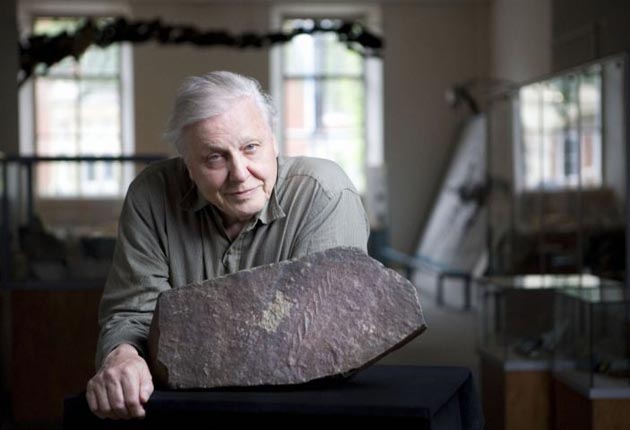Pay attention, 007: Daniel Craig moves into Sir David Attenborough's territory

Your support helps us to tell the story
From reproductive rights to climate change to Big Tech, The Independent is on the ground when the story is developing. Whether it's investigating the financials of Elon Musk's pro-Trump PAC or producing our latest documentary, 'The A Word', which shines a light on the American women fighting for reproductive rights, we know how important it is to parse out the facts from the messaging.
At such a critical moment in US history, we need reporters on the ground. Your donation allows us to keep sending journalists to speak to both sides of the story.
The Independent is trusted by Americans across the entire political spectrum. And unlike many other quality news outlets, we choose not to lock Americans out of our reporting and analysis with paywalls. We believe quality journalism should be available to everyone, paid for by those who can afford it.
Your support makes all the difference.It will be hard to fill the mighty planet-traversing shoes of Sir David Attenborough, Britain's greatest broadcasting naturalist.
But the BBC has found an alternative to his voice in Daniel Craig, the actor better known to cinema-goers as James Bond.
Craig has been chosen to spearhead an attempt by the BBC to use natural history to generate millions of pounds from international film audiences and ease the acute funding problems at the corporation. In his first venture into film narration, he will feature in One Life, a film that uses footage from the acclaimed BBC series Life, which has been hosted by Sir David since it first appeared as Life On Earth in 1979.
Craig said he was "very proud" to be part of the project. "The BBC Natural History Unit have proven, year after year, that their documentary skills are second to none," he said. "For the filmmakers who spend their entire lives recording beautiful images of dwindling wildlife, I have only a sense of awe and a deep rooted respect."
One Life is being made by BBC Earth, a global brand for BBC Worldwide, the commercial arm of the BBC, which means the film is not being funded by the licence fee but is an investment designed to generate more money. It is one of three movies by BBC Earth which will take the corporation's natural history expertise into cinemas. The others will be Walking with Dinosaurs 3D and a wildlife movie, provisionally entitled Africa 3D.
Amanda Hill, managing director of the BBC Earth and Walking with Dinosaurs brands at BBC Worldwide, said the intention was to make films that were "as entertaining as they are informative". She said: "Audiences know that a BBC production will bring them the most compelling stories from nature and with [theatrical release] we have the opportunity to do this on a cinematic scale." In One Life, Craig will describe the escapades of around 20 animals, from a Darwin's beetle to a humpback whale.
Sir David, who will be 85 next month, returns to BBC television in the autumn with a seven-part series Frozen Planet, which is expected to be his last large-scale project for the corporation. A retrospective is being planned for next year to mark the 60th anniversary of his joining the BBC.
One Life, which is in HD, will launch in Japan in September and is expected to arrive in British cinemas before the end of the year. It takes a broader theme than the Life television series and is seen by the BBC as a separate project. "The TV series was about the diversity of all the animal groups on the planet, a very encyclopaedic look," said Neil Nightingale, creative director for BBC Earth. "For theatrical [release] we saw a unique story ... that was very suitable for a cinema audience. That was the story that no matter how different the millions of species on earth are, including [humans], they all go through the same stages of life and have the same challenges and aspirations."
Walking with Dinosaurs 3D is a three-year $65m (£39m) project with Twentieth Century Fox and the star of the film will be a pachyrhinosaur, a plant-eating creature from 70 million years ago. Full production begins next month and the film is expected to be released in 2013.
"There is no subject that is better suited to 3D than natural history," said Mr Nightingale. "3D works really well when it immerses you in different worlds – think of the world of Avatar and how it takes you to that fabulous rainforest setting." Audiences, he said, will feel "as though they are walking amongst great herds of dinosaurs and experiencing them for real".
The film, set in Alaska, hopes to build on the popularity of the Walking with Dinosaurs arena tour, which BBC Worldwide has taken around the globe. Mr Nightingale said of the pachyrhinosaur: "They were social animals and lived in herds," he said. "There were many aspects of their biology which made them great to tell a story, all supported by the fossil finds." Ms Hill said the "really soft" pachyrhinosaurs would appeal to women and children, which was important in ensuring the film's commercial success.
Africa 3D is also a three-year project and filming has not yet begun. "We will be able to transport people to the most fabulous locations and it will be the closest it will ever feel to being there without going there for real," said Mr Nightingale. "It's an epic journey of discovery to discover how nature is more magical than anything we could ever conjure up in our own imagination."
Join our commenting forum
Join thought-provoking conversations, follow other Independent readers and see their replies
Comments